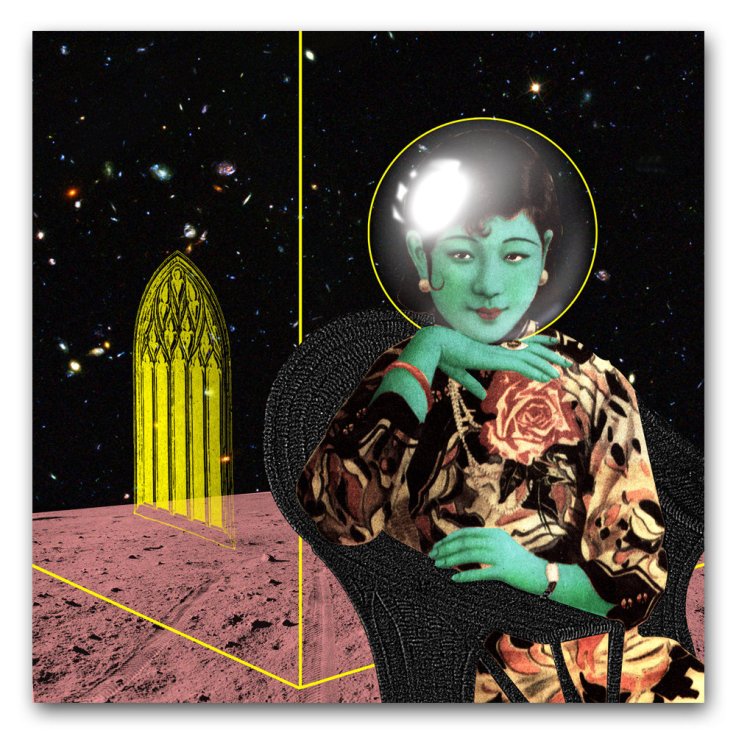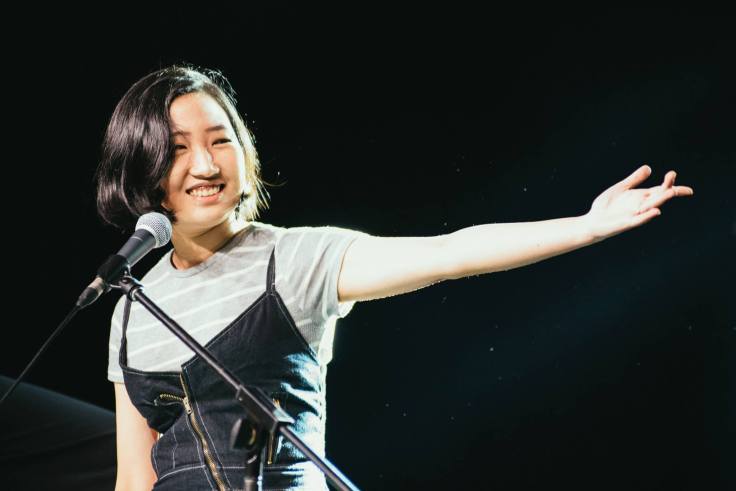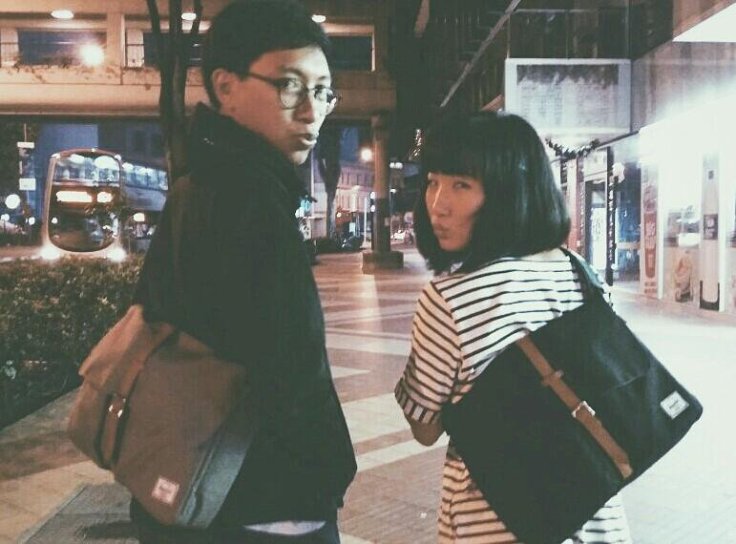A sharp inhalation, then the calming, repetitive notes of a keyboard. Backing vocals,
instrumentals, a seamless transition between electronic and organic. The rhythmic percussion first sounds almost like bongos, but the sharp licks at each beat suggest perhaps a more synthetic alternative. Combine this with erudite, playful lyrics and
vocals reminiscent of singers like Mitski and Maggie Rogers, and you get
local band [.gif].
This electronic duo, composed of Chew Wei Shan and Nurudin Sadali, known stylistically as ‘weish’ and ‘din’, aestheticise their sound with the beautiful and bizarre, just like the artwork by Marc Gabriel Loh that they use as a profile photo on Facebook — one of an old-timey Chinese lady with green skin in space, smiling through the sheen of a glass sphere around her head.

Wei Shan and Nurudin met as MOE scholars who stuck together as ‘two disillusioned
Literature majors’ in a character-building camp with many enthusiastic participants.
They spoke passionately about the music they were creating at the time, began gathering whatever gear they had during the camp, and [.gif] was born. ‘We just went see how lah!’ — that’s what Wei Shan had to say about this encounter when we met her in a cozy cafe called Cups and Canvas.
What began as a casual fascination with a looper her friends bought for her transformed into amazement about the possibilities that different equipment could achieve for her in her music. When she is not performing inventive underground gigs as part of [.gif], she works as a Literature teacher at School of the Arts — unsurprising given the deft lyricism the band displays.
We were struck immediately by her passion not only for local indie music, but for the faces behind it. Wei Shan talks about local bands and performers like NADA and Tim De Cotta with equal parts admiration and familiarity. But this understanding of the local music scene was never intuitive to Wei Shan. Her lived experience as both a performer and a part of the audience plays a big part in her passion to contribute to local music. In fact, she spent a lot of her time as a teen attending underground gigs and watching Singaporean performers in cafes and ‘lobangs’.
In the music she could recognise a mature, thought-through, measured anger — towards the institutions and corporations and monumental hypocrisy that make up organised Singapore. She also detected a fresh experimentation and creativity she says she found hard to produce with the strict, rule-bound classical music she was trained in. ‘I find the musicians I’ve worked with, who have no formal training, they have a strange sort of freedom — to explore how chords and melodies move in a very genuine way, without being bogged down with preconceived notions of harmony and structure.

Today, Wei Shan recognises a different problem in the local music scene.While support is, perhaps, growing on both a public and policy level, a divide is widening between more popular acts and indie performers. Arguably, the first local music most Singaporeans listen to are bands like The Sam Willows or Gentle Bones, but that’s where the exploration stops. Singaporeans are less willing to continue looking for and finding independent acts, which she argues deserve just as much support, if not more. ‘It’s not easy to be supported and known in Singapore if you don’t play things people aren’t willing to look for. And unfortunately support and recognition are exactly what [Singaporean musicians] need to survive.’
Of course, Wei Shan is is happy to give credit where its due, identifying the increased support from the government. Although Wei Shan called [.gif] an ‘unambitious band’, the government has channeled money towards making sure they were given both local and overseas exposure — from Brisbane to Singapore to China. ‘As much as local acts gripe about having a lack of support, we do learn from other countries that arts support is not a thing. It really is not a thing that most countries enjoy in the first place.’ Even having an Arts Council is not a privilege overseas acts have. Yet, their arts scene is blossoming beyond ours — just from ground support.
Today, [.gif] is very much a part of the local indie music landscape. They also contribute to organising big events from time to time, like the 100 Bands Festival for three years running. She and Nurudin work hard to prove the age-old adage — ‘got quality means got quality’. While the less astute might see her passion as a fight for local music, upon closer inspection she believes strongly in making sure all local acts, both popular and indie get the recognition they deserve for producing good music.

Does she think her Rafflesian identity might have shaped the music she produces?
To her, it did, but in very indirect ways. The friends she hung out with would sacrifice
studying to go for local concerts — the same bands and performances which would shape her tastes in music, both local and international. She was also in the Music Elective Programme, which was part of the classical training she is very grateful for. While this same classical training may have shuttered a certain amount of creativity in the beginning, there are a lot of technical endeavours she undertakes more intuitively and efficiently because of her training. And more importantly, music also helped her through the tough times she faced in JC. ‘Music got me through the hardest days. I’m
sure you identify!’
What does Wei Shan have to say to some of the bands in RI, and aspiring musicians?
‘I have two slightly contrasting pieces of advice. Firstly, just take that step, people! Put [your work] out there. You never know what kind of response you will get unless you do it.’
‘The second piece of advice is: don’t “yaya papaya”, do your homework. Go to shows, see what’s out there, and listen to a diverse array of music. It’s like any other thing that you create, like if you’re a sculptor or a writer – you need to be aware of the collective consciousness of art-making at the point where it is today. Knowing and honouring your [musical] influences also enables you to: one, not fall into clichés; and two, respect that you’re not that special and that you need to constantly find a place for yourself to say something meaningful.’
.gif’s latest album, soma, is available free on Spotify as well as Soundcloud. Additionally, do visit .gif at https://dotgifdotgif.bandcamp.com to learn more and support their music.